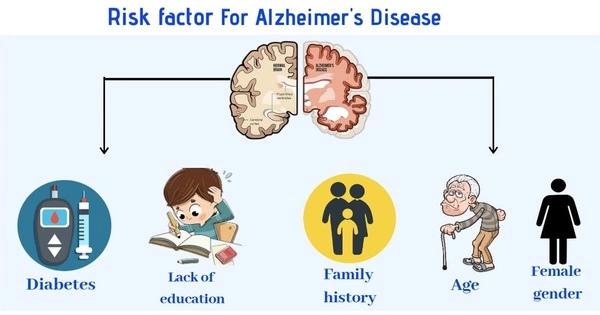According to research, education may have a preventive impact against the development of Alzheimer’s disease, even in people who have genetic risk factors for the disease. While possessing specific genetic variations, such as the APOE ε4 allele, has been connected to an elevated risk of Alzheimer’s disease, having a higher degree of education has been linked to a lower risk and a delayed onset of the disease.
A recent study by Mass General Brigham and Women’s Hospital researchers shows that when it comes to the risk of Alzheimer’s disease, even genetically defined forms of the disease, genetics is only one piece of the jigsaw. Researchers studied data from 675 persons who contain a mutation that predisposes them to early-onset Alzheimer’s disease to evaluate the impact of genetics and educational achievement on cognitive decline.
Carriers of this mutation, known as PSEN1 E280A, develop dementia at a median age of 49. The researchers discovered that carriers who also carried a second risk gene, APOE e4, had an earlier age of onset of cognitive deterioration. The age of onset was delayed in carriers who had an APOE e2 mutation, which is known to be protective.
Higher educational attainment may have a protective effect against cognitive impairment, even in the presence of strong genetic risk factors. Despite the additional risk conferred by APOEe4, the strongest genetic risk factor for sporadic Alzheimer’s disease, our results suggest that educational attainment may be a critical mechanism of cognitive reserve in familial Alzheimer’s disease.
Yakeel Quiroz
The researchers also looked at how educational attainment affected cognitive function in PSEN1 E280A mutation carriers, including individuals with varied APOE genotypes. They discovered that higher educational attainment, or more years of education, was connected with preserved cognitive ability, especially in those who were genetically predisposed to it.
“Higher educational attainment may have a protective effect against cognitive impairment, even in the presence of strong genetic risk factors,” said corresponding author Yakeel Quiroz PhD, a clinical neuropsychologist and neuroimaging researcher, director of the Familial Dementia Neuroimaging Lab in the Departments of Psychiatry and Neurology at Massachusetts General Hospital.

A higher degree of education, including formal schooling, cognitive training, and mental stimulation, has been linked to a lower risk of Alzheimer’s disease in numerous studies. Education may improve cognitive reserve, or the brain’s ability to endure injury and operate efficiently in the face of underlying dysfunction.
“Despite the additional risk conferred by APOEe4, the strongest genetic risk factor for sporadic Alzheimer’s disease, our results suggest that educational attainment may be a critical mechanism of cognitive reserve in familial Alzheimer’s disease.”
Education is frequently linked to a variety of lifestyle factors that can improve general brain health. Engaging in intellectually stimulating activities, maintaining social relationships, and having a healthy lifestyle that includes regular physical activity and a balanced diet are examples of these.
Investigators from Massachusetts General Hospital, Brigham and Women’s Hospital, Mass Eye and Ear, as well as national and international collaborators, were part of the research team.
















